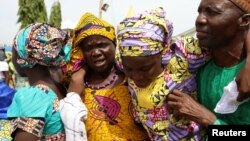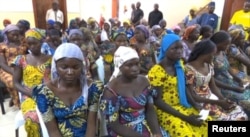The Nigerian government recently negotiated the release of 82 of the Chibok schoolgirls taken by Boko Haram in 2014. Foreign governments and aid groups have been assisting the young women as they undergo rehabilitation in the Nigerian capital.
One-hundred-and-six liberated Chibok girls remain in the capital under the custody of the Nigerian Ministry of Women Affairs.
The majority were released by Boko Haram during a prisoner swap last month, just more than three years after their kidnapping. Others were freed via negotiations in October. Three of the girls escaped on their own.
The ministry is providing them with skills training, educational classes and psychosocial support.
Women Affairs Minister Aisha Jummai Alhassan spoke at a recent event in Abuja. She said one of the government’s main priorities for the freed Chibok girls is to ensure that they return to school, possibly in September.
“They are going back to school because they had aspirations. That was why their parents put them in school from where they were abducted. When they stabilize and when they recover, we will still put them back to school,” she said.
The government said the girls will not return to their former school in Chibok, which has sparked criticism from activists and the girls’ families. But the government says it is protecting the girls and monitoring their rehabilitation, which includes recreational activities, weekly religious programs and classes in biology, math and English. The rehabilitation is expected to last nine months.
“Wherever they are, the fact that they are not with the terrorists is considered OK for them,” says Allen Manasseh, a member of the Bring Back Our Girls Group.
Manasseh spoke to some of the girls at the rehab center and he told VOA they said they are doing fine. Two of Manasseh’s cousins are among the Chibok girls still missing.
Foreign governments and aid groups are helping out in the rehab process.
The Canadian government recently donated dignity kits containing sanitary items and clothes to the freed Chibok girls. They smiled while the kits were handed out, but did not make any statements.
”The Chibok Girls are symbolic of a vast humanitarian challenge affecting millions of lives," says Christopher Thornley, the Canadian High Commissioner to Nigeria. "This is why Canada has stepped up this year to provide $27 million to U.N. agencies and NGO partners for humanitarian assistance in the northeast. This includes $2 million that we have provided the UNFPA to support the Chibok girls as well as its interventions in the northeast.”
The Chibok girls were Boko Haram’s largest and most high-profile kidnapping. The militants abducted 276 girls from their dormitories in Chibok in April 2014. More than 100 of the girls are still missing.
The Nigerian government says hostage negotiations with Boko Haram are ongoing.
VOA Hausa service contributed to this report.






